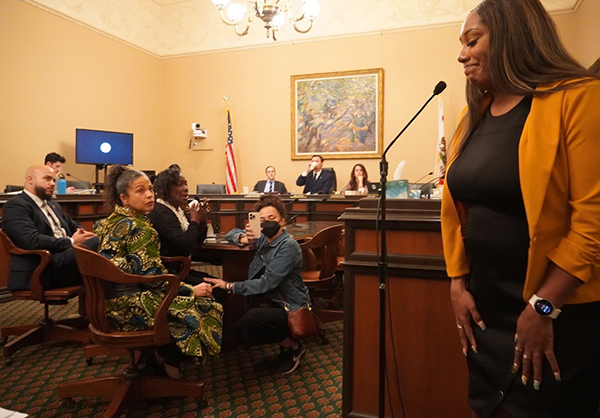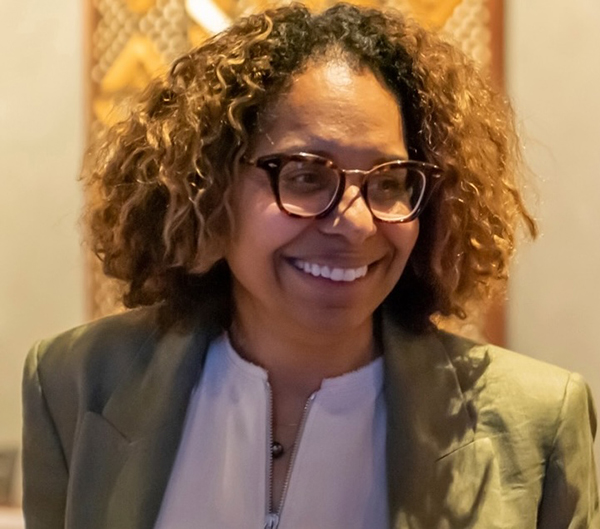Bill requiring family notification of inmate death is signed

Stephanie Jeffcoat, right, speaks in support of Assembly Bill 1269, ‘Wakeisha’s Law,’ at an Assembly Public Safety Committee hearing at the State Capitol in April. Seated left to right are Assemblyman Issac Bryan, author of the bill; Melina Abdullah, co-founder of Black Lives Matter Los Angeles; Lisa Hines, mother of Wakeisha Wilson; and Sheila Bates, an organizer for Black Lives Matter.
Photo by Antonio Ray Harvey
By Antonio Ray Harvey
Contributing Writer
SACRAMENTO — Gov. Gavin Newsom signed Assembly Bill 1269 into law on Oct. 13.
Also known as “Wakiesha’s Law,” the legislation, authored by Assemblyman Isaac Bryan, D-Culver City, requires county and city jails to promptly notify families when an incarcerated individual is seriously hospitalized or dies while in custody.
“If your loved one died in custody, you have the right to know, and you deserve to know,” Bryan told members of the Assembly Public Safety Committee last April.
In March 2016, 36-year-old Wakiesha Wilson was found unresponsive in her cell at the Los Angeles Police Department’s Metropolitan Detention Center. She was later pronounced dead. Her family was not notified for four days, forcing them to contact the coroner’s office themselves.
Bryan created the bill to increase transparency and accountability for law enforcement authorities in cases like Wilson’s. It ensures that families are promptly informed when a loved one dies in custody, providing what supporters call “basic decency and respect.”
An LAPD report noted there were five in-custody deaths in 2023, a 400% increase from the one death reported in 2022, according to the Los Angeles Daily News.
In 2018, an investigation by the Los Angeles Times found that 19 people died in LAPD jails between 2012 and 2016 and at least 102 people attempted suicide during those five years. As of July 15 of this year, 26 people had died in Los Angeles County jails, the second-most deaths to date of any year on record, the Vera Institute of Justice reported.
Founded in 1961 and based in Brooklyn, the Vera Institute for Justice advocates for ending the criminalization and mass incarceration of people of color, immigrants and people experiencing poverty.
“Overcrowding and staff prone to both negligence and flagrant mistreatment towards incarcerated people have continued to make (L.A.’s Main Central Jail) and the county jail system at large, a dangerous, even fatal, place to be,” said Michelle Parris, director of the Vera California initiative.
The California State Sheriffs’ Association opposed AB 1269, claiming that it understands “the desire to facilitate contact with loved ones when an incarcerated person becomes seriously ill,” but the bill “leaves many open questions,” the association stated in the Assembly Bill Policy Committee Analysis.
The Los Angeles County District Attorney’s Office released a 24-page document stating that neither the LAPD nor the nurses and physicians who rendered medical help were “criminally liable for Ms. Wilson’s death.”
“It is the conclusion of this office that the manner of Wakiesha Wilson’s death was a suicide,” the memorandum stated.
Wilson’s mother, Lisa Hines, also testified before the Assembly Public Safety Committee, chaired by Assemblyman Nick Schultz, D-Burbank, recounting the painful experience of searching for her daughter.
“It was the longest four days of my life,” Hines said.
Antonio Ray Harvey is a reporter for California Black Media.





